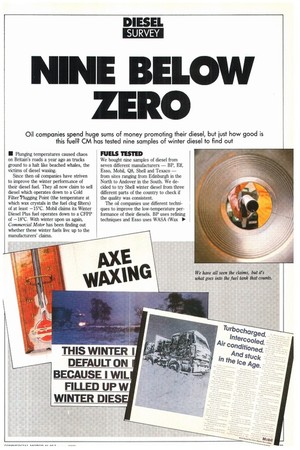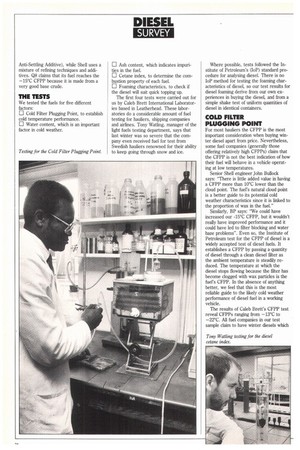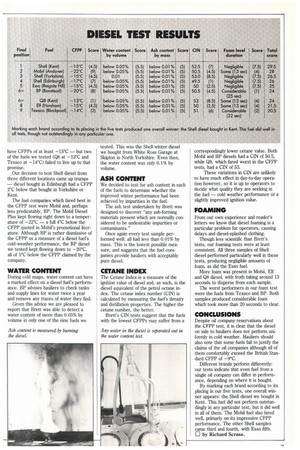NINE BELOW ZERO
Page 35

Page 36

Page 37

If you've noticed an error in this article please click here to report it so we can fix it.
Oil companies spend huge sums of money promoting their diesel, but just how good is this fuel? CM has tested nine samples of winter diesel to find out
IN Plunging temperatures caused chaos on Britain's roads a year ago as trucks ground to a halt like beached whales, the victims of diesel waxing.
Since then oil companies have striven to improve the winter performance of their diesel fuel. They all now claim to sell diesel which operates down to a Cold Filter 'Plugging Point (the temperature at which wax crystals in the fuel clog filters) of at least —15°C. Mobil claims its Winter Diesel Plus fuel operates down to a CFPP of —18°C. With winter upon us again, Commercial Motor has been finding out whether these winter fuels live up to the manufacturers' claims.
FUELS TESTED
We bought nine samples of diesel from seven different manufacturers — BP, Elf, Esso, Mobil, Q8, Shell and Texaco — from sites ranging from Edinburgh in the North to Andover in the South. We decided to try Shell winter diesel from three different parts of the country to check if the quality was consistent.
The oil companies use different techniques to improve the low-temperature performance of their diesels. BP uses refining techniques and Esso uses WASA (Wax Anti-Settling Additive), while Shell uses a mixture of refining techniques and additives. Q8 claims that its fuel reaches the —15°C CFPP because it is made from a very good base crude.
THE TESTS
We tested the fuels for five different factors: Cold Filter Plugging Point, to establish cold temperature performance.
CI Water content, which is an important factor in cold weather. El Ash content, which indicates impurities in the fuel.
El Cetane index, to determine the combustion property of each fuel. El Foaming characteristics, to check if the diesel will suit quick topping up.
The first four tests were carried out for us by Caleb Brett International Laboratories based in Leatherhead. These laboratories do a considerable amount of fuel testing for hauliers, shipping companies and airlines. Tony Watling, manager of the light fuels testing department, says that last winter was so severe that the company even received fuel for test from Swedish hauliers renowned for their ability to keep going through snow and ice. Where possible, tests followed the Institute of Petroleum's (IoP) standard procedure for analysing diesel There is no IoP method for testing the foaming characteristics of diesel, so our test results for diesel foaming derive from our own experiences in buying the diesel, and from a simple shake test of uniform quantities of diesel in identical containers.
COLD FILTER PLUGGING POINT
For most hauliers the CFPP is the most important consideration when buying winter diesel apart from price. Nevertheless, some fuel companies (generally those offering relatively high CFP13s) claim that the CFPP is not the best indication of how their fuel will behave in a vehicle operating at low temperatures.
Senior Shell engineer John Bullock says: "There is little added value in having a CFPP more than 10°C lower than the cloud point The fuel's natural cloud point is a better guide to its potential cold weather characteristics since it is linked to the proportion of wax in the fuel."
Similarly, BP says: "We could have increased our -15°C CFPP, but it wouldn't really have improved performance and it could have led to filter blocking and water haze problems". Even so, the Institute of Petroleum test for the CFPP of diesel is a widely accepted test of diesel fuels. It establishes a CFPP by passing a quantity of diesel through a clean diesel filter as the ambient temperature is steadily reduced. The temperature at which the diesel stops flowing because the filter has become clogged with wax particles is the fuel's CFPP. In the absence of anything better, we feel that this is the most reliable guide to the likely cold weather performance of diesel fuel in a working vehicle.
The results of Caleb Brett's CFPP test reveal CFPPs ranging from —13°C to —22°C. All fuel companies in our test sample claim to have winter diesels which have CFPPs of at least -15°C but two of the fuels we tested (Q8 at -13°C and Texaco at -14°C) failed to live up to that promise.
Our decision to test Shell diesel from three different locations came up trumps diesel bought in Edinburgh had a CFPP 2°C below that bought in Yorkshire or Kent.
The fuel companies which fared best in the CFPP test were Mobil and, perhaps Less predicatably, BP. The Mobil Diesel Plus kept flowing right down to a temperature of -22°C a full 4°C below the CFPP quoted in Mobil's promotional literature. Although BP is rather dismissive of the CFPP as a measure of a diesel fuel's cold-weather performance, the BP diesel we tested kept flowing down to -20°C, all of 5°C below the CFPP claimed by the company.
WATER CONTENT
During cold snaps, water content can have a marked effect on a diesel fuel's performance. BP advises hauliers to check tanks and supply lines for water twice a year and remove any traces of water they find.
Given this advice we are pleased to report that Brett was able to detect a water content of more than 0.05% by volume in only one of the nine fuels we tested. This was the Shell winter diesel we bought from White Ross Garage at Skipton in North Yorkshire. Even then, the water content was only 0.1% by volume.
ASH CONTENT
We decided to test for ash content in each of the fuels to determine whether the improved winter performance had been achieved by impurities in the fuel.
The ash test undertaken by Brett was designed to discover "any ash-forming materials present which are normally considered to be undesirable impurities or contaminants."
Once again every test sample performed well: all had less than 0.01% by mass. This is the lowest possible measure, and suggests that the fuel companies provide hauliers with acceptably pure diesel.
CETANE INDEX
The Cetane Index is a measure of the ignition value of diesel and, as such, is the diesel equivalent of the petrol octane index. The cetane index number (CIN) is calculated by measuring the fuel's density and distillation properties. The higher the cetane number, the better.
Bretes CIN tests suggest that the fuels with the lowest CFPPs may suffer from a
correspondingly lower cetane value. Both Mobil and BP diesels had a ON of 50.5, while Q8, which fared worst in the CFPP tests, had a CIN of 53.
These variations in CIN are unlikely to have much effect in day-to-day operation however, so it is up to operators to decide what quality they are seeking in the fuel cold weather performance or a slightly improved ignition value.
FOAMING
From our own experience and reader's letters we know that diesel foaming is a particular problem for operators, causing delays and diesel-splashed clothing.
Though less scientific than Brett's tests, our foaming tests were at least consistent. All three samples of Shell diesel performed particularly well in these tests, producing negligible amounts of foam, as did the Esso fuel.
More foam was present in Mobil, Elf and Q8 diesel, with froth taking around 13 seconds to disperse from each sample.
The worst performers in our foam test were the fuels from Texaco and BP. Both samples produced considerable foam which took more than 20 seconds to clear.
CONCLUSIONS
Despite oil company reservations about the CFPP test, it is clear that the diesel on sale to hauliers does not perform uniformly in cold weather. Hauliers should also note that some fuels fail to justify the claims of the oil companies although all of them comfortably exceed the British Standard CFPP of -9°C.
Different brands perform differently: our tests indicate that even fuel from a single oil company can differ in performance, depending on where it is bought.
By marking each brand according to its placing in our five tests, one overall winner appears: the Shell diesel we bought in Kent. This fuel did not perform outstandingly in any particular test, but it did well in all of them. The Mobil fuel also fared well, primarly on its impressive CFPP performance. The other Shell samples came third and fourth, with Esso fifth. El by Richard Scrase.




















































































































